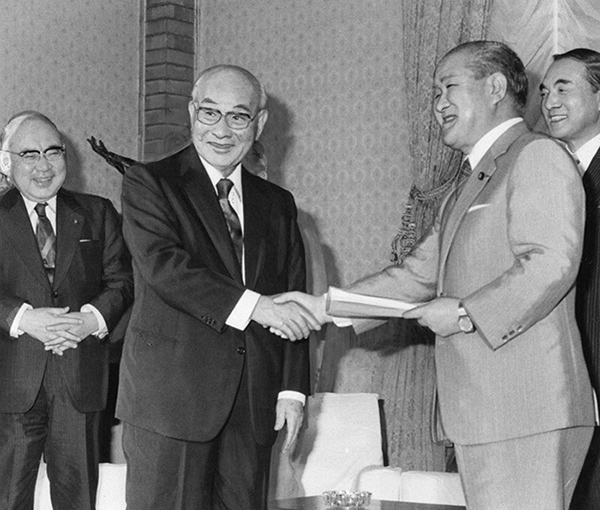In March 1981, I was appointed as a member of the Second Extraordinary Administrative Research Council. This council was formed for the purpose of making drastic administrative reform proposals to enable fiscal restructuring without raising taxes. I was a member of the Administrative Management and Inspection Committee since April 1979, and I joined the extraordinary council as a representative of industry. There were nine members, and Toshio Doko (honorary chairman of the Federation of Economic Organizations) chaired the council.
The extraordinary council met about once a week, and when we approached the deadline for submitting a report, we worked late into the night for days, including Saturdays and Sundays. Over two years up to March 1983, we submitted three reports to the prime minister: an urgent report, a basic report, and a final report. They each got a lot of attention in the newspapers, so the content of the reports were widely known.
My feeling is, despite our best efforts, the content of the reports was not necessarily satisfactory. Although we wanted to tackle problems at a more fundamental level, we also needed to consider what was feasible, so we settled on proposals most likely to gain consensus.
Nonetheless, our proposals were substantial, such as reducing the budget while keeping tax hikes low, as well as the privatization of Japanese National Railways and Nippon Telegraph and Telephone Public Corporation. Moreover, it was very meaningful that the Japanese people in general became more aware of the importance of fiscal restructuring and administrative reform.
I think the essence of restoring public finances is to cut spending and use taxes efficiently. It’s also important to consider how to increase corporate tax revenue without raising the tax rate. But the bureaucrats try to increase taxes through technicalities.
For example, the lump-sum severance payment for employees used to be 50% tax-exempt in case of voluntary resignation, but that was reduced to 40% two years ago, and this time they wanted to lower it to 30%. Since this is a de facto tax increase, I was strongly opposed. Although we managed to stop it for a now, it might come up again, so we can’t let our guard down.
The biggest reason for deteriorating public finances is the slow increase in corporate tax revenues due to dull corporate growth. Although the prescriptions may differ by business type, the common theme should be to gain tax revenue by invigorating companies. Unfortunately this wasn’t discussed.
The simplest way to cut government spending is to decrease personnel expenses by reducing the number of people working. For the national government, local governments, and special corporations, total personnel expenses are 28 trillion yen. I know it’s not easy to reduce personnel, so I’m not suggesting that people be laid off. There is a natural attrition of about 4% per year, so if new hiring is reduced to half the replacement rate, in five years the annual payroll would be 2.5 trillion yen lower.
If private companies get into financial trouble, they freeze new hiring and maybe even call for early retirement. The extraordinary council proposed a 5% reduction in government personnel over five years. The final report said new recruitment would be permitted but should be constrained, so we don’t know what the net reduction would be.
There are a lot of problems with how tax money is spent, too. I won’t cover everything, but consider the regional distribution of funds. The national government is currently loaning some 11 trillion yen to local governments as part of the Fiscal Investment and Loan Program to compensate for local government tax subsidies. But no interest is collected on the loans, and the national government bears half of the principal. There’s a long story why it ended up this way, but for whatever reason, the government is loaning money without interest and even shouldering half of the principal.
At the current annual interest rate of 7.3%, that should bring 800 billion yen into the national treasury in interest per year. The national fiscal deficit would be reduced, and local government finances would be tightened. They started collecting half of the interest in fiscal 1983, but there’s no reason not to make it the full amount.
When Zenko Suzuki was prime minister he cut government spending by about 1 trillion yen in total by freezing recommendations by the National Personnel Agency. In the short term, that was a much more effective way to reduce the deficit than having us deliberate in the extraordinary council for two years. The prime minister can get a lot done by showing some leadership.
Cutting the deficit without raising taxes is ultimately a political issue, depending on the prime minister’s judgment and ability to act. As someone who took part in the extraordinary council, I would like to see that happen.
 From the left, Miyazaki, Dokou (the 2nd Administrative Investigation Committee),
From the left, Miyazaki, Dokou (the 2nd Administrative Investigation Committee),
Suzuki (70th prime minister), Nakasone (71st prime minister).

